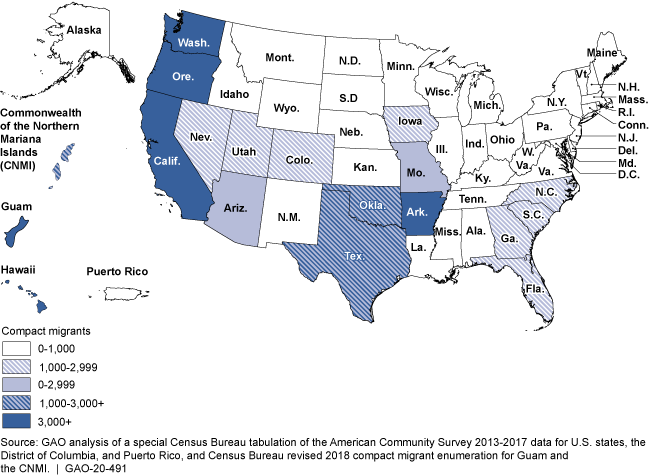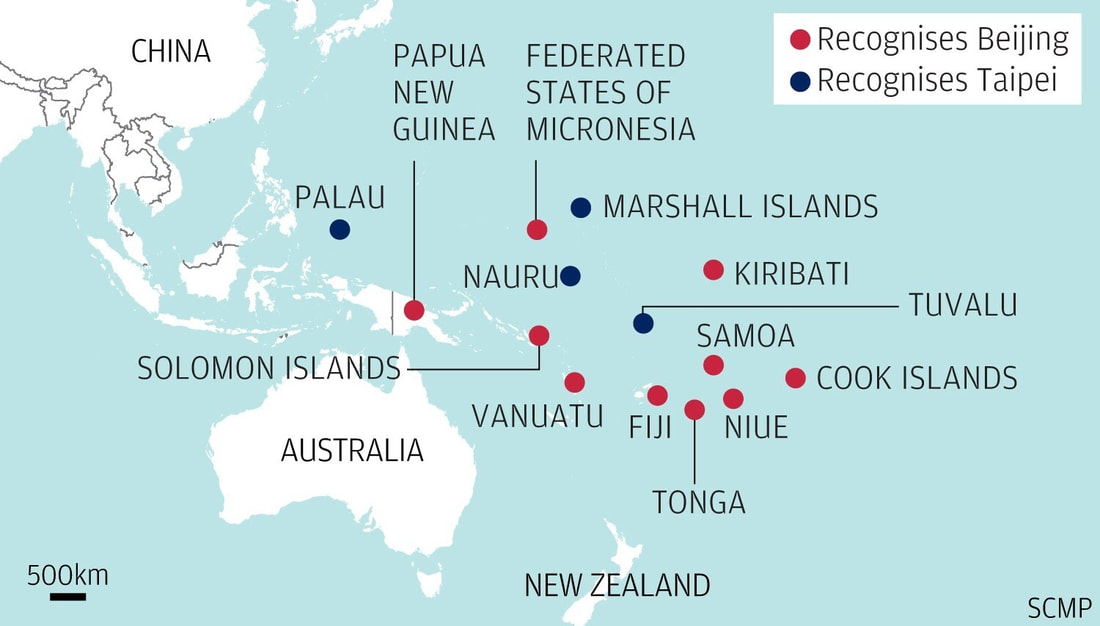|
To uphold its diplomatic influence in the Pacific region, the United States maintains special agreements with the Freely Associated States (FAS), which include the Republic of the Marshall Islands, Federated States of Micronesia, and the Republic of Palau. This set of agreements, known as the Compacts of Free Association (COFA), functions symbiotically, allowing the U.S. to establish military installations on FAS land and oversee policies related to security, while providing economic assistance for the island states. In addition, COFA makes FAS citizens residing in the U.S. mainland or its territories eligible for federal health and education services and permits them to serve in the U.S. military. Since its enactment in 1986, the unique arrangement has also helped facilitate migration from the FAS to the U.S. According to a recent study by the Government Accountability Office (GAO), the population of compact migrants living in the U.S. increased by nearly 70% between 2005-2018, and it is expected to continue to rise. There are now four states on the mainland that are home to 3,000+ FAS citizens. (Source: GAO) The population growth of compact migrants in the U.S. has led to higher costs for states and territories due to increased demand for the government’s social services included in COFA. COFA’s economic and federal assistance provisions will expire by the end of 2024. This presents the Biden Administration with an opportunity to elevate the needs of FAS citizens and reaffirm a standing U.S. commitment to support the Pacific Islands. Doing so would help the U.S. counter growing tensions with China, which have been exacerbated by COVID-19, and provide it with a key foreign policy tool to contain Beijing’s strategic ambitions in the region. COFA’s Historical Context In the immediate aftermath of World War II, the U.S. conducted a series of nuclear detonations over the Marshall Islands as part of its atomic testing program. While the U.S. eventually cleaned much of the nuclear contamination, it deposited large amounts of lethal radioactive waste into a massive concrete structure known as the “Runit Dome.” The effects of climate change have led to rising sea levels around the islands, posing a risk of nuclear leakage if the dome cracks or collapses. Some studies have already reported that levels of nuclear fallout in some parts of the Marshall Islands rival that of Chernobyl, which has impacted the long-term health and safety of the Marshallese people and their environment. The U.S. has borne responsibility for the effects of its past testing programs in the region, and it has made numerous financial commitments to cover costs related to health and community restoration. The U.S. must continue to recognize and honor these commitments that it owes to the Marshallese. Public Health Implications Encouraging developments surrounding the ongoing fight against the COVID-19 pandemic emerged in February 2021, as the U.S. Food and Drug Administration (FDA) confirmed the safety and efficacy of a third vaccine, instilling optimism that it could expedite a return to normalcy. For some demographic groups across the U.S., it is hard to think about a normal future when their present remains grim. It is well known that COVID-19 has disproportionately affected minorities nationwide, but recent reports have revealed even more troubling trends for FAS citizens and Pacific Islanders, specifically. One article noted that in Marion County, Oregon, Pacific Islanders experience almost double the rates of hospitalization and death when compared to other ethnic and racial groups. In Marion County, the Islander community is nearly four times more likely to become infected. Their mortality rate is 19 deaths out of 10,000 compared to 7.5 out of 10,000 for the total population. The Washington State Department of Health found that death rates for Pacific Islanders in Washington are almost six times higher than for the white population. In Sacramento County, California, Islander residents only account for about 1% of the county’s population, but they suffer fatality rates that are approximately twice as large as the county average. Factors for this health inequity could include language barriers, multigenerational housing, cultural customs, and more risk of exposure due to frontline worker employment. Most notably, Pacific Islanders are already victims of disproportionate rates of pre-existing conditions, such as birth defects and cancer, due to the long-term effects of U.S. nuclear testing, making it more likely that they suffer from COVID-19 complications. Fortunately, Congress finally restored Medicaid coverage for Pacific Islanders in the December 2020 spending bill, ending a decades-long injustice and delivering timely support for their communities. Mr. Eldon Alik, the General Counsel of the Marshall Islands in Arkansas, noted, “Many of our folks came here to not only seek medical care, but also employment and educational opportunities for our families. We are not a rich nation, and we come here to look for the American dream.” Foreign Policy Implications A 2018 report by the U.S. Department of State identified the Marshall Islands as one of the most loyal countries to the U.S. at the United Nations (UN) in terms of voting records, which further highlights the need to renew funding for COFA. Because the pandemic has placed additional strain on U.S.-China relations, it is crucial that the U.S. maintain key alliances in the Pacific. China’s geopolitical ambitions in the South Pacific are no secret, as it has now become the third-largest contributor of foreign investment to the region’s sovereign island nations since 2006. As part of its Belt and Road Initiative (BRI), China has worked to grow its economic and political clout through massive infrastructure projects, raising concerns that its engagement in the Pacific could appeal to governments in the region, especially as they seek to expand their economies. While Beijing continues to downplay its motives for scaling up diplomatic and commercial activities in the South Pacific, it appears to be interested in neutralizing or discouraging foreign recognition of Taipei, the capital of Taiwan and a city that embraces Western culture. The U.S. and Taiwan do not engage in formal relations, but Washington’s prior demonstrations of support for the island have been a major point of contention for the Chinese Communist Party (CCP), which claims its sovereignty over the island and has even threatened invasion. A Reuters report analyzed budget documents and suggested that Chinese investment in the Pacific islands depends on each country’s ties to Taiwan. In September 2019, two Pacific Island nations, Kiribati and the Solomon Islands, severed diplomatic relations with Taiwan in favor of China, dwindling Taipei’s foreign allegiances in the region. (Source: South China Morning Post) Through its pledges to heavily invest in the South Pacific, Beijing’s successful luring of two island nations reveals its intentions to exert political influence and compete for economic dominance in the region. As COVID-19 continues to create a need for financial assistance abroad, the Biden Administration must renegotiate COFA ahead of its 2024 expiration as a way to recognize the loyalty of valuable partners at the UN. It would also prevent any lapse that would give Beijing a window of opportunity to court other Pacific nations like the Marshall Islands and Palau, which both still recognize Taipei. Access to their waters, airspace, and land provide an invaluable strategic significance for the U.S. to counter China’s influence. The public health and foreign policy implications of COVID-19 underscore the importance of reauthorizing and strengthening the expiring COFA provisions. Renewal would send a signal that the U.S. remains committed to honoring its obligations to the Marshallese and other key allies in the region. A renewed pact would also ensure that the rising population of FAS migrants residing in the U.S. mainland and its territories receive adequate federal assistance to confront existing health disparities, while providing the U.S. with the capability to implement an effective Indo-Pacific strategy against Chinese influence in the region.
The views expressed above are solely the author's and are not endorsed by the Virginia Policy Review, The Frank Batten School of Leadership and Public Policy, or the University of Virginia. Although this organization has members who are University of Virginia students and may have University employees associated or engaged in its activities and affairs, the organization is not a part of or an agency of the University. It is a separate and independent organization which is responsible for and manages its own activities and affairs. The University does not direct, supervise or control the organization and is not responsible for the organization’s contracts, acts, or omissions.
0 Comments
Your comment will be posted after it is approved.
Leave a Reply. |
Categories
All
Archives
April 2022
|
ADDRESSVirginia Policy Review
235 McCormick Rd. Charlottesville, VA 22904 |
|
SOCIAL MEDIA |


